Key Takeaways: Best EFSS for Productivity
- Box Business — Excellent in-house apps and third-party integrations to productivity tools
- Egnyte — Many third-party connections, including to Google and Microsoft
- Dropbox Business — Native apps and external connections to popular apps
- Zoho WorkDrive — Extensive suite of native apps for a number of different industries
- Huddle — Excellent file collaboration with connections to Microsoft
Enterprise file synchronization and share (EFSS) providers give businesses the tools they need to boost productivity. Examples include connections to external services, providing in-house apps or supporting easy file sharing. Many of the enterprise file sync and share providers on this list are among the best EFSS services. Read on to see the best EFSS for productivity.
Internal apps and external connections that support collaboration are two of the elements used to measure how well an enterprise file synchronization and share service supports productivity. Each EFSS solution in the below list offers some combination of both. If you’re looking for a quick answer, Box Business is our top choice, followed by Egnyte and Dropbox Business.
What Makes the Best EFSS for Productivity?
Having apps that connect to popular productivity suites such as Google Workspace and Microsoft 365 is one of the main ways that enterprise file sync and share solutions support productivity.
Most businesses need more than just a place to store and share files. The more apps an EFSS provider has, the more flexibility it gives a business to meet its requirements. With that, internal apps and external connections factor heavily into this list.
How well an enterprise file sync and share service handles other elements besides productivity can’t be understated. Local apps and virtual drives are important considerations. Security and privacy are also significant factors, especially for data loss prevention and data security.
The 5 Best EFSS for Productivity
Box Business is our recommended choice, offering the best combination of productivity apps and unlimited storage for a reasonable price tag.
1. Box Business
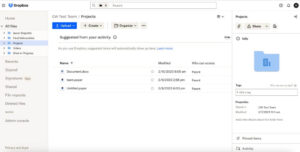
More details about Box Business:
- Pricing: Unlimited storage for $15 per month (one-year plan)
- Free plan: 10GB individual plan; 14-day free trial on most business plans
- Provider website: box.com
Pros:
- Native applications
- External integrations
- Unlimited storage
Cons:
- Slow speeds
- No block-level sync
Box Business has a host of collaboration and productivity apps and connections. Most are found in the “apps” tab in an account’s left sidebar. Connecting to Google Workspace, Apple’s app suite and Microsoft 365 allows you to create and edit those respective files from your Box Business account. Other popular external connections include Slack, Airtable and Zapier.
Box Business also has a lot of native apps for real-time collaboration. Box Notes is one example, a web-based word processor that lets you share and collaborate in real time. Box Canvas functions like a digital whiteboard. With each Box Business account, you can create and assign tasks on files and communicate through a comments feature, with everything populating across devices.
Box Drive
Box Drive is essential to a Box Business account, as it works like an external hard drive, storing your data and providing access without taking up local disk space. The Box Drive app has selective sync functionality, letting you designate which folders to sync or leave offline. Any work you do on the file within the app and Box Drive will keep the changes synced with your cloud account.
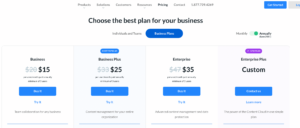
making it easy to store corporate data.
Box Business has four plans, three of which have a 14-day free trial. All business plans come with unlimited storage. The Business Plus plan costs $25 per user per month, billed annually. Check out our Box Business review for more.
- Single user
- 10GB
- Single user
- 100GB
- Price per user, minimum of three users
- 100GB
- Users: No limit
- Unlimited GB
- Users: No limit
- Unlimited GB
- Users: No limit
- Unlimited GB
2. Egnyte

More details about Egnyte:
- Pricing: 1TB for $10 per month (one-year plan)
- Free plan: None; 15-day free Business plan trial
- Provider website: egnyte.com
Pros:
- Highly customizable
- External integrations
- Custom 2FA security
Cons:
- Expensive plans
- No private encryption
Egnyte is a fantastic EFSS that fosters collaboration and productivity throughout the platform. Egnyte makes connecting your account to Microsoft 365 and Google Workspace productivity apps easy with a dedicated app center. Most of Egnyte’s apps are in-house and support creating, opening and editing the respective files — Word or Sheets, for example — within the app.
Another in-house app called Egnyte WebEdit tracks your changes while using an app — such as Excel — and updates the changes within your account when you save or close the file.
You are not limited to only Google or Microsoft, as the Egnyte app center has several external connections. You can connect your Egnyte account to Slack, DocuSign, SalesForce and many more. Additionally, Engyte supports tasks and workflows within a document. By creating a series of tasks, you’ll establish a workflow for team members to follow.
File Sharing
Egnyte’s enterprise file sharing has plenty of flexibility and customization options. Sharing a folder lets you add individuals using email with plenty of permission settings. You can add a password for an additional layer of protection and decide who is required to use the password.
When file sharing with a link, you can set an optional password for added protection. You can also add a link expiration date to determine how many days the link will stay active.
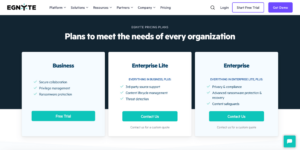
Egnyte does not have a free plan, but its Business and Team plans offer a 15-day free trial. Transitioning to a paid Business plan will cost $20 per user per month, while the Team plan is $10 per user per month, both billed annually. Egnyte also has two Enterprise plans, but you’ll have to contact Egnyte for pricing. For more information, read our Egnyte review.
- 1-10 users max.
- 1TB
- Price per user; Secure collaboration; Privilege management; Ransomware protection
- 1TB
- Everything in Business; 3rd-party source support; Content lifecycle management; Threat detection
- 1TB
- Everything in Enterprise Lite; Privacy & compliance; Advanced ransomware protection & recovery; Content safeguards
- 1TB
3. Dropbox Business

accessible using the tabs in the left sidebar.
More details about Dropbox Business:
- Pricing: 5TB for $15 per month (one-year plan)
- Free plan: 30-day free trial on most business plans
- Provider website: dropbox.com/business
Pros:
- Enterprise file sharing
- External connections
- Excellent file sync
Cons:
- No zero-knowledge security
- Can be pricey
Dropbox Business has many internal apps and external connections that support team productivity and collaboration. You can connect to Microsoft 365 and Google Workspace from your Dropbox Business account, creating and editing files from those ecosystems without leaving Dropbox. Additionally, you can connect to other popular apps, such as Slack, Zoom and Trello, from the app center.
Dropbox Business has many in-house apps designed to support teams and productivity. DocSend and eSign are tools to help you send and receive electronic signatures. Dropbox Paper is its most well-known app, a web-based word processor that allows you to collaborate in real time and invite others from within the document, even on mobile devices.
Private Encryption
Dropbox Business does not have private encryption, meaning that you are not the only one who can potentially access your data, limiting data security and data loss prevention. However, Dropbox recently purchased Boxcryptor to add private encryption to its service, so while you can’t enable private encryption today, you should have the option in the near future.

the enterprise file sharing and sync service.
Dropbox has several business plans with different storage allotments and features. Most have a 30-day free trial. The Advanced plan costs $24 per user per month when billed annually and offers 5TB of shared storage per user license (minimum of three). We go into more detail with our Dropbox pricing guide and Dropbox Business review.
- Price per user, 30-day free trial
- 3TB
- Price per user, 30-day free trial
- 3TB
- Price per user, shared storage, 30-day free trial
- 5TB
- Price per user, 30-day free trial
- 5TB
- Price & storage per user, 30-day free trial. Minimum 3 users (15TB). 1000TB total cap.
- 5TB
4. Zoho WorkDrive
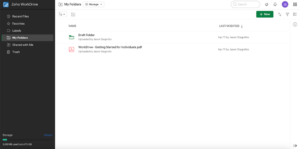
with personal file sharing accounts.
More details about Zoho WorkDrive:
- Pricing: 1TB for $2.50 per month (one-year plan)
- Free plan: Free individual 5GB plan; 15-day free trial
- Provider website: zoho.com/workdrive/
Pros:
- Great affordability
- Unlimited versioning
- App ecosystem
Cons:
- No private encryption
- Small file sizes
Zoho WorkDrive works seamlessly with a host of apps created to support most businesses. While Zoho WorkDrive is a cloud storage tool, productivity and collaboration come from connecting to other Zoho products. You can find other Zoho apps from the app center, accessible from within your account.
Zoho WorkDrive has familiar apps such as Writer, Sheet and Show, where you can create documents, spreadsheets and presentations. You can connect a mail client to your account or even a messaging app. For businesses, Zoho WorkDrive has other apps, like one designed explicitly for payroll.
Admin Console
The admin console is the main area for managing users, teams and configurations. The dashboard provides a snapshot of your account activity and includes information such as the number of active members, number of folders, pending invites or how much storage is still available.
The admin console has several tabs to help you manage team folders, members and devices. Another tab, called “client users,” lets you invite external users to a project or team folder. You can specify how long each external user has access, up to a year. Additionally, anyone invited externally does not need to create a Zoho account.
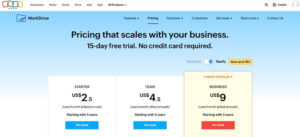
great for businesses on a tight budget.
Zoho WorkDrive offers three plan options: Starter, Team and Business. All three have a 15-day free trial. The Starter plan costs $2.50 per user per month, billed annually, and has 1TB of shared data. We cover pricing and more in our Zoho WorkDrive review.
- One user
- 5GB
- Users: 3+
- 1TB
- Users: 3+
- 3TB
- Users: 3+
- 5TB
5. Huddle
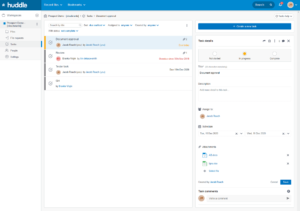
file sharing or editing files.
More details about Huddle:
- Free plan: 30-day free trial
- Provider website: ideagen.com/huddle
Pros:
- Great collaboration tools
- Microsoft 365 integration
- Easy to use apps
Cons:
- Limited features
- Expensive
Huddle is not a traditional cloud storage service. It is a software-as-a-service document collaboration tool designed for larger teams. It can handle a high volume of files and make them available to many people.
Huddle’s primary integration is with Microsoft 365, so to get the most out of the service, it helps if you’re an avid Microsoft user. With the Microsoft integration, you can create and edit documents within Huddle and collaborate in real time with team members.
Although it is mainly used as a document collaboration tool, Huddle includes project management features and tools. You can converse with team members within each file using the comments feature. There’s a view where you can see any activity on the file and the number of versions. Additionally, there’s a window to assign and complete tasks specific to the file or project.
Workspaces
Workspaces are a tool within Huddle that let you categorize projects and create a self-contained area that won’t interfere with other documents. You can invite external collaborators to work on files or upload information.
With a workspace, you can add team members and invite external people while determining the level of access for teams. You can create groups within the workspace and compartmentalize access and files for each team.
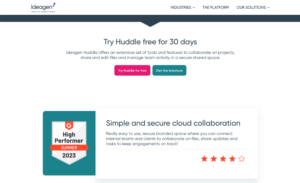
Huddle has a 30-day free trial. However, that’s only accessible by submitting a request, and you’ll only get access to the trial after you go through a sales-pitch style introduction with a Huddle employee. Pricing is not advertised directly on Huddle’s site, and you’ll only get that information after the guided demo. For more, check out our Huddle review.
- Users: 15+, Total Storage: 500GB, Price is per user
- Users: 25+, Total Storage: 1TB, Price is per user
- Minimum Users: 100+, Total Storage: Unlimited, Price is per user
Final Thoughts
There is no shortage of excellent options when looking for the best EFSS provider for productivity. Box Business and Dropbox Business offer great value for money and have several in-house apps and are supported by connections to Microsoft and Google. For those who can afford it, Egnyte is an excellent option with plenty of internal apps and external connections in a highly customizable product.
Zoho WorkDrive has many in-house apps that support businesses from several industries, combined with external integrations. Huddle is an excellent option for file collaboration, although it is light on features and connections.
Which enterprise file sync and share products do you use to support productivity? What sort of productivity features do you look for in an EFSS? Did we miss a great enterprise file sync and share service? Let us know in the comments section below. Thanks for stopping by to read our article.
FAQ
-
Enterprise file sync and share providers are cloud storage services that let businesses or organizations securely store and share files in the cloud or with on-premise storage. Companies or organizations can access and share the data with internal teams and external clients or customers.
-
Using an EFSS solution for productivity gives businesses and organizations the flexibility to create, edit, store and share files with internal teams or external clients. In-house productivity apps and third-party external connections allow businesses and organizations to choose preferred productivity apps.
-
The difference between cloud backup and cloud storage is that cloud backup services keep a copy of your data, while cloud storage keeps your files synced across your devices. We go more in-depth in our cloud backup vs cloud storage article.
{“@context”:”https:\/\/schema.org”,”@type”:”FAQPage”,”mainEntity”:[{“@type”:”Question”,”name”:”What Is Enterprise File Sync and Share?”,”acceptedAnswer”:{“@type”:”Answer”,”text”:”
Enterprise file sync and share providers are cloud storage services that let businesses or organizations securely store and share files in the cloud or with on-premise storage. Companies or organizations can access and share the data with internal teams and external clients or customers.\n”}},{“@type”:”Question”,”name”:”Why Use an EFSS Service for Productivity?”,”acceptedAnswer”:{“@type”:”Answer”,”text”:”
Using an EFSS solution for productivity gives businesses and organizations the flexibility to create, edit, store and share files with internal teams or external clients. In-house productivity apps and third-party external connections allow businesses and organizations to choose preferred productivity apps.\n”}},{“@type”:”Question”,”name”:”What Is the Difference Between Cloud Backup and Cloud Storage?”,”acceptedAnswer”:{“@type”:”Answer”,”text”:”
The difference between cloud backup and cloud storage is that cloud backup services keep a copy of your data, while cloud storage keeps your files synced across your devices. We go more in-depth in our cloud backup vs cloud storage article.\n”}}]}
The post Top Enterprise File Sync and Share (EFSS) for Productivity in 2023: Best EFSS Solutions to Increase Output appeared first on Cloudwards.



